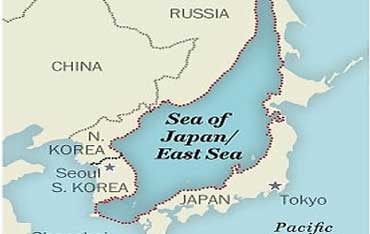- California Assembly OKs highest minimum wage in nation
- S. Korea unveils first graphic cigarette warnings
- US joins with South Korea, Japan in bid to deter North Korea
- LPGA golfer Chun In-gee finally back in action
- S. Korea won’t be top seed in final World Cup qualification round
- US men’s soccer misses 2nd straight Olympics
- US back on track in qualifying with 4-0 win over Guatemala
- High-intensity workout injuries spawn cottage industry
- CDC expands range of Zika mosquitoes into parts of Northeast
- Who knew? ‘The Walking Dead’ is helping families connect
East Sea bill sails along in Virginia
By Kang Seung-woo
There’s only two more hurdles to clear before the U.S. State of Virginia adopts a bill to have school textbooks use the East Sea together with the Sea of Japan.
Virginia would be the first U.S. state to translate “geographical equality” into action, removing educational misunderstanding from the unilateral use of the Sea of Japan for the body of water that is shared with Korea.
Virginia’s House Education Committee approved a bill Monday in a lopsided 18-3 vote to use the East Sea as well as the Sea of Japan in the state’s future textbooks.
First, the East Sea bill, dubbed “House Bill 11,” now heads to the House plenary session for a final vote expected Thursday.
The last hurdle is Governor Terry McAuliffe, who is under heavy lobbying pressure by Japan. However, McAuliffe has repeatedly vowed not to use his veto power.
A Senate version of the legislation has already passed and the House Education Subcommittee barely approved it 5-4 last week.
“Every step at the House and the Senate was really tough, but now we only have a bit more to go till we reach our goal,” Peter Kim, who leads the group Voice of Korean Americans, was quoted as saying.
Chances are high that it will pass the floor, given the level of support in the chamber. Since the legislation was already approved by the Senate, its fate will likely depend on McAuliffe, who has the power to veto legislative measures.
An angry Japan has interrupted the move, pressing the governor, who promised the bill in last year’s election as part of gaining votes from the sizable population of ethnic Koreans.
Japanese Ambassador Kenichiro Sasae sent a letter to him in December warning that economic ties between Japan and the state would be hurt, while hiring a team of lobbyists from McGuireWoods, one of the most prominent lobbying firms in Richmond, to press the case, noting that the U.S. government and an international authority that charts bodies of water use the term “Sea of Japan.”
But the governor’s aide made it clear that his boss will sign, should the House clear the bill.
“He has been very clear in his statements that if the legislation passes the General Assembly, he will sign it,” spokesman Brian Coy was quoted as saying by Yonhap News.
Despite unfavorable conditions, Japanese Foreign Minister Fumio Kishida said Tuesday that Japan will continue efforts to win understanding of its stance on the issue and support for it from assembly members and others in Virginia and elsewhere.
“The U.S. government recognizes Sea of Japan as the sole official name for the sea area concerned,” Kishida said, according to Japan’s Kyodo News. “We will continue to firmly explain the correct way of thinking about the name Sea of Japan and our country’s position on the issue.”
For Koreans, the East Sea is historically the correct name, and the Sea of Japan is a painful relic of Japan’s imperialistic past.















